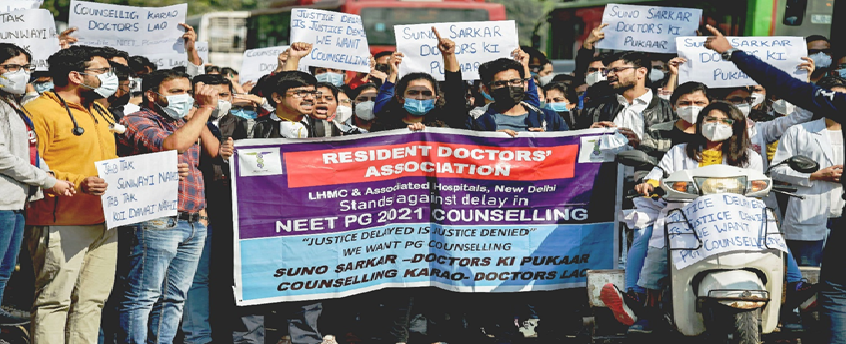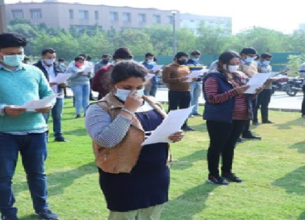SC upholds validity of OBC quota in NEET admissions
21, Jan 2022

Prelims level : Judiciary
Mains level : GS-II Functions and Responsibilities of the Union and the States, Issues and Challenges Pertaining to the Federal Structure, Devolution of Powers and Finances up to local levels and Challenges Therein
Why in News?
- The Supreme Court recently upheld the constitutional validity of quota for Other Backward Classes candidates in National Eligibility cum Entrance Test’s (NEET) All India Quota seats for undergraduate and postgraduate medical and dental courses, noting that “Reservation is not at odds with merit” in open competitive examinations.
What was the Apex Court’s ruling?
- If open examinations present equality of opportunity to candidates to compete, reservations ensure that the opportunities are distributed in such a way that backward classes are equally able to benefit from such opportunities which typically evade them because of structural barriers.
- This is the only manner in which merit can be a democratising force that equalises inherited disadvantages and privileges.
- Otherwise claims of individual merit are nothing but tools of obscuring inheritances that underlie achievements.
- The court said an open competitive exam only ensures formal equality and does not end widespread ingrained inequalities in the availability of and access to educational facilities to certain classes of people, including the Other Backward Classes (OBC).
What is NEET?
- The National Eligibility-cum-Entrance Test (NEET) is the entrance examination for entry to all undergraduate (NEET-UG) and postgraduate (NEET-PG) medical and dental courses in the country.
- Until 2016, the All India Pre-Medical Test (AIPMT) was the national-level entrance Examination for Medical Colleges.
- State Governments used to hold separate entrance tests for seats that were not contested at an all-India level.
- NEET was held for the first time in 2003, but discontinued the following year.
- On April 13, 2016, the Supreme Court upheld the newly inserted section 10-D of the Indian Medical Council Act.
- This provided for a uniform entrance examination to all medical educational institutions at the undergraduate level and postgraduate level in Hindi, English and various other Languages.
- Since then, NEET has been the uniform entrance test for medical courses across the country.
What is the All-India Quota?
- Although the same examination is held across the country, a chunk of the seats in state medical/dental colleges is reserved for students domiciled in their respective states.
- The remaining seats —15% in UG and 50% in PG — are surrendered by the states to the All India Quota.
- The AIQ scheme was introduced in 1986 under the directions of the Supreme Court to provide for domicile-free, merit-based opportunities to students from any state to study in a good medical college in any other state.
- A student Domiciled in Uttar Pradesh, for example, may be eligible for admission to a seat in a state Government medical college in West Bengal, provided she scores high enough in the National Merit List.
- If her score is not high enough for AIQ, she may still hope for admission under the state quota in her home state.
- In deemed/central universities, ESIC, and Armed Forces Medical College (AFMC), 100% seats are Reserved under the AIQ.
What was the Reservation Policy followed so far?
- Until 2007, no reservation was implemented within the All-India Quota for medical admission.
- On January 31, 2007, in Abhay Nath v University of Delhi and Others, the Supreme Court directed that reservation of 15% for Scheduled Castes and 7.5% for Scheduled Tribes be introduced in the AIQ.
- The same year, the Government passed the Central Educational Institutions (Reservation in Admission) Act, 2007 providing for 27% reservation to OBC students in central Government Institutions.
- While state government medical and dental colleges provide reservations to OBCs in seats outside the All India Quota, this benefit was so far not extended to seats allocated under the AIQ in these State Colleges.
- The 10% EWS quota under the Constitution (One Hundred And Third Amendment) Act, 2019, too, has been implemented in central educational institutions, but not in the NEET AIQ for state Institutions.
What led to the Decision?
- The denial of OBC and EWS reservations has been the subject of protests for years.
- In July last year, the Madras High Court ruled that OBC students too can avail reservation in the AIQ.
- It held that the reservation could not be implemented for the then academic year for want of time, and can be implemented from 2021-22.
Way Forward:
- The privileges that accrue to forward classes are not limited to having access to quality schooling and access to tutorials and coaching centres to prepare for a competitive Examination but also includes their social networks and Cultural Capital (communication Skills, accent, books or Academic Accomplishments) that they inherit from their family.
- The cultural capital ensures that a child from the forward classes is trained unconsciously by the familial environment to take up higher education or high posts commensurate with their family‘s standing.
- This works to the disadvantage of individuals from social backward classes who are first-generation learners and come from communities whose traditional occupations do not result in the transmission of necessary skills required to perform well in open examination.
- Thus, merit is not solely of one’s own making. The rhetoric surrounding merit obscures the way in which family, schooling, fortune and a gift of talents that the society currently values aids in one‘s advancement.
- Thus, the exclusionary standard of merit serves to denigrate the dignity of those who face barriers in their advancement which are not of their own making.







